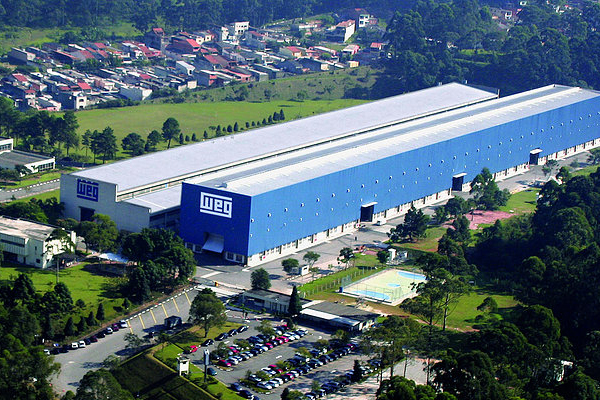RIO DE JANEIRO, BRAZIL – Of the 33 new Brazilian billionaires, according to the most recent list published by Forbes magazine, nearly a third – ten – are linked to the Santa Catarina industrial giant Weg.

The family company, founded by three German descendants in 1961, now has 13 heirs in the select billion-dollar club. This ascension is related to the impressive appreciation of the company’s shares over the past 12 months, which has exceeded 240 percent and raised its market value to over R$150 billion.
But what is Weg’s secret? For a long time the company has been considered a safe investment, for its solid and consistent results, but for a year now the financial market has awakened once and for all to its basics. Despite the novel coronavirus pandemic, Weg’s shares have increased 120 percent this year, according to Economática, leading the list of companies with the highest appreciation in the IBOVESPA, the São Paulo Stock Exchange.
The inclusion of the heirs of its founders in the billionaire list is justified. Despite being listed on the Stock Exchange since 1971, nearly two thirds of Weg shares continue to belong, directly and indirectly, to Werner Ricardo Voigt, Eggon João da Silva and Geraldo Werninghaus’ relatives (the three already deceased). Initially founded as Eletromotores Jaraguá – a reference to Jaraguá do Sul, a city that still today houses its headquarters – some years later the company was given its current name, Weg, using the initials of the founders’ names. Weg also means “path” in German.
Weg is constantly referred to as an “oasis” of prosperity in the increasingly weakened Brazilian industrial sector. In a recent interview with Estadão news outlet, the president of Itaúsa, Alfredo Setubal, described the company as an “outlier” – a point off the curve. Recognized for its organizational culture, human resources and innovation, Weg found itself benefiting from a convergence of positive factors amid the turbulence of Covid-19.
According to analyst Thais Cascello, from Itaú BBA, the company showed resilience to the crisis in the second quarter for having been benefited by the performance of its international business, particularly in “long cycle” products, such as engines for industries and power plants. With 61 percent of revenue collected abroad, the company saw its revenue in Brazilian currency inflated by the recent dollar spike. The result: cash generation reached R$732 million, a 36 percent increase over the same period in 2019.
In a recent report, Itaú BBA redoubles its bet on this positive cycle for the third quarter results. The bank places Weg as the likely leader in results between July and September and mentions that the company may break records in the period. This is because other favorable factors are added to the previous quarter’s scenario. “Sales of Weg’s short cycle products, such as engines for white goods and paints and varnishes for the building sector, seem to have made a ‘V’ recovery,” explains Thais.
Trajectory
And to think it all started with three old cars. Weg founders started the company with a capital equivalent to three VW Beetles – each one entered with a capital that, at the time, would buy one of the most popular of cars in Brazil. The company began manufacturing engines – one of the flagship cars in its portfolio to date – and, even amid the Brazilian economic miracle, started exporting in 1970.
The first steps were taken in neighboring Argentina and Paraguay. Gradually, the experience spread to other regions, gathering steam from the 2000s. By late 2019, the company had 58 percent of its business abroad. In addition to selling products manufactured locally, the company opened plants in more than a dozen markets, with China and Mexico (responsible for serving the US market) as the most relevant. Today, Weg employs 30,000 people worldwide, 12,000 of whom in Brazil.
Weg’s president for 12 years, Harry Schmelzer Júnior has worked in the company since 1980. The executive explains that the company owes a great deal of what it is today to its international operation: this bet not only opened new markets, but – more importantly – gave Weg access to knowledge and technologies that did not exist in Brazil.
“We knew that to fight our competitors, we needed to have a global quality product”, says Schmelzer Júnior. He recalls that the company invests 2.5 percent of its annual net income in research and development.
Another Weg feature, according to analysts, is the consistency of its operation. And this is reflected in a long-standing team of executives who, like the current president, were raised in-house. In 59 years, the company had only three presidents: co-founder Eggon João da Silva, his son Décio da Silva and now Schmelzer Júnior. “From all my international executives in the industrial area, in these Weg’s 40 years, only one of them resigned to work elsewhere”, Schmelzer proudly says.
And what keeps the team motivated? According to founder Eggon, who died in 2015, it’s the opportunities. To create challenges and innovate, he preached that the company could not restrict itself – it should always seek to grow and open borders. “Innovation doesn’t come from the machine, it comes from people,” he used to say.
Source: O Estado de S. Paulo

